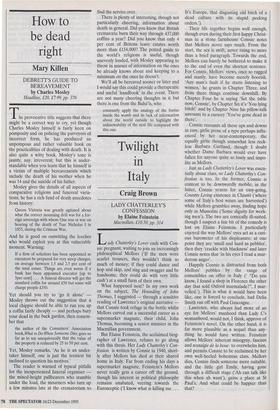Twilight in Italy
Craig Brown
LADY CHATTERLEY'S CONFESSION by Elaine Feinstein Macmillan, £10.50, pp. 314 Lady Chatterley's Lover ends with Con- nie pregnant, waiting to join an increasingly philosophical Mellors CH the men wore scarlet trousers, they wouldn't think so much of money; if they could dance and hop and skip, and sing and swagger and be handsome, they could do with very little cash') at a small farm of their own.
What happened next? In my own work on the subject, The Hounding of John Thomas, I suggested — through a sensitive reading of Lawrence's original narrative that Connie took refuge in the bottle whilst Mellors carved out a successful career as a supermarket magnate, their child, John Thomas, becoming a senior minister in the Macmillan government.
But Elaine Feinstein, the acclaimed biog- rapher of Lawrence, refuses to go along with this thesis. Her Lady Chatterley's Con- fession is written by Connie in 1940, short- ly after Mellors has died at their shared home in Italy. Far from ending his days a supermarket magnate, Feinstein's Mellors never really gets a career off the ground, though his interest in political philosophy remains unabated, veering towards the Eurosceptic CI know what is killing me . . . It's Europe, that disgusting old bitch of a dead culture with its stupid pecking orders.').
Their life together begins well enough, though even during their first happy Christ- mas in a stone farmhouse Connie notes that Mellors never says much. From the start, the sex is swift, never rising to more than a brief paragraph. Towards the end, Mellors can barely be bothered to make it to the end of even the shortest sentence. For Connie, Mellors' views, once so rugged and manly, have become merely boorish. `Any man's fault if he starts listening to women,' he grunts in Chapter Three, and from there things continue downhill. By Chapter Four he is saying 'Set the table now, Connie', by Chapter Six it's 'You lying bitch!' and by Chapter Nine his pillow-talk amounts to a cursory 'You've gone dead in there'.
Connie recounts all these ups and downs in easy, girlie prose of a type perhaps influ- enced by her near-contemporary, the equally girlie though somewhat less reck- less Barbara Cartland, though I doubt whether Dame Barbara would ever have fallen for anyone quite so lowly and impo- lite as Mellors.
Just as Lady Chatterley's Lover was essen- tially about class, so Lady Chatterley's Con- fession is too. In the former, Connie is content to be downwardly mobile; in the latter, Connie yearns for an easy-going, Country Living existence in Chianti (`where some of Italy's best wines are harvested') while Mellors grumbles away, finding hope only in Mussolini (`Some dignity for work- ing men'). The two are comically ill-suited, though I suspect a fair bit of the comedy is lost on Elaine Feinstein. I particularly enjoyed the way Mellors' eyes act as a curi- ous barometer of his displeasure: at one point they are 'small and hard as pebbles', then they 'crackle with blackness' and later Connie notes that 'in his eyes I read a mur- derous anger'.
Happily Connie is distracted from both Mellors' pebbles by the range of comestibles on offer in Italy (` "Do you know, I found a shop in Florence the other day that sold Oxford marmalade?", I mar- velled.'). This is what it would have been like, one is forced to conclude, had Delia Smith run off with Paul Gascoigne.
Lawrence, who always had more of an eye for Mellors' manhood than Lady C's womanhood, would not, I think, approve of Feinstein's novel. On the other hand, it is far more plausible as a sequel than any- thing he would have written. Feinstein allows Mellors' inherent misogyny, fascism and nostalgie de la boue to overwhelm him, and permits Connie to be reclaimed by her own well-heeled bohemian class. Mellors dies, Connie finds someone more suitable, and the little girl Emily, having gone through a difficult stage (`Ah can talk like this when ah want'), gains a place at St Paul's. And what could be happier than that?










































































































 Previous page
Previous page